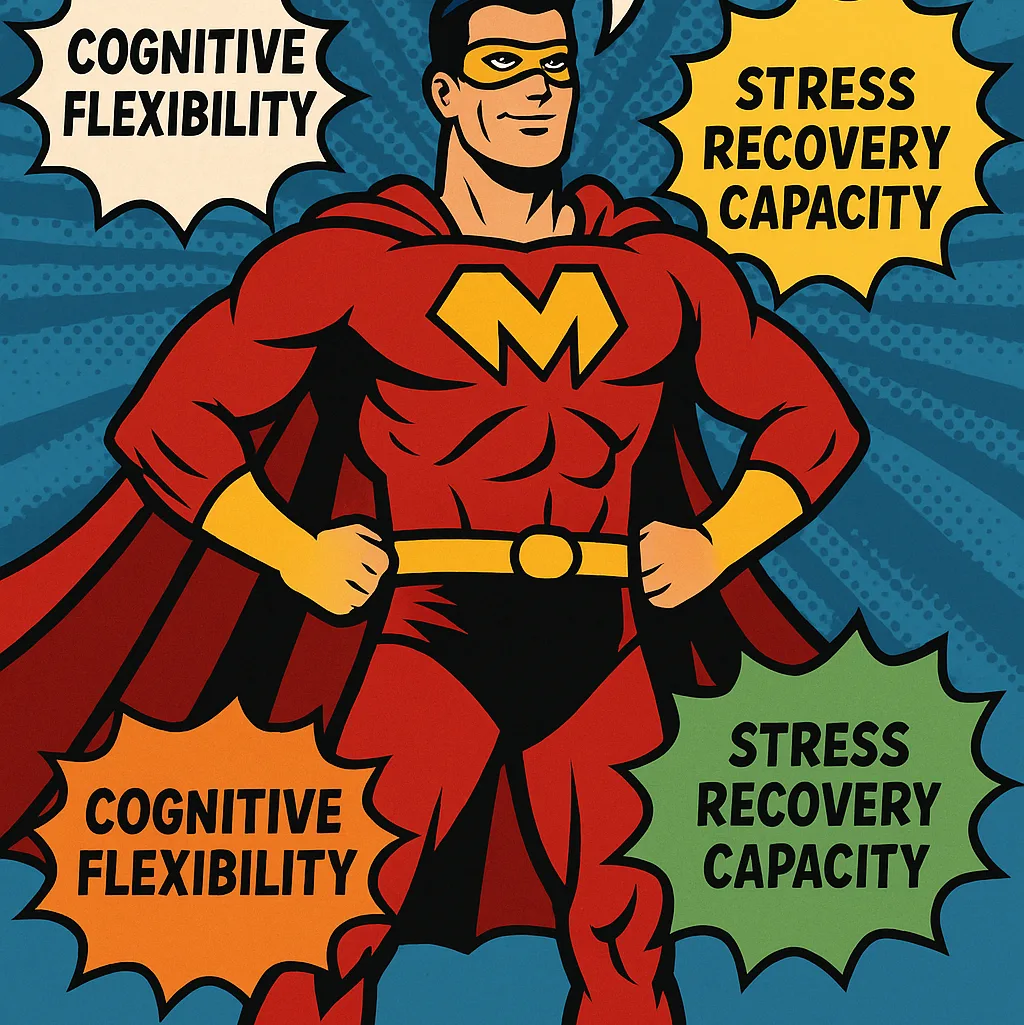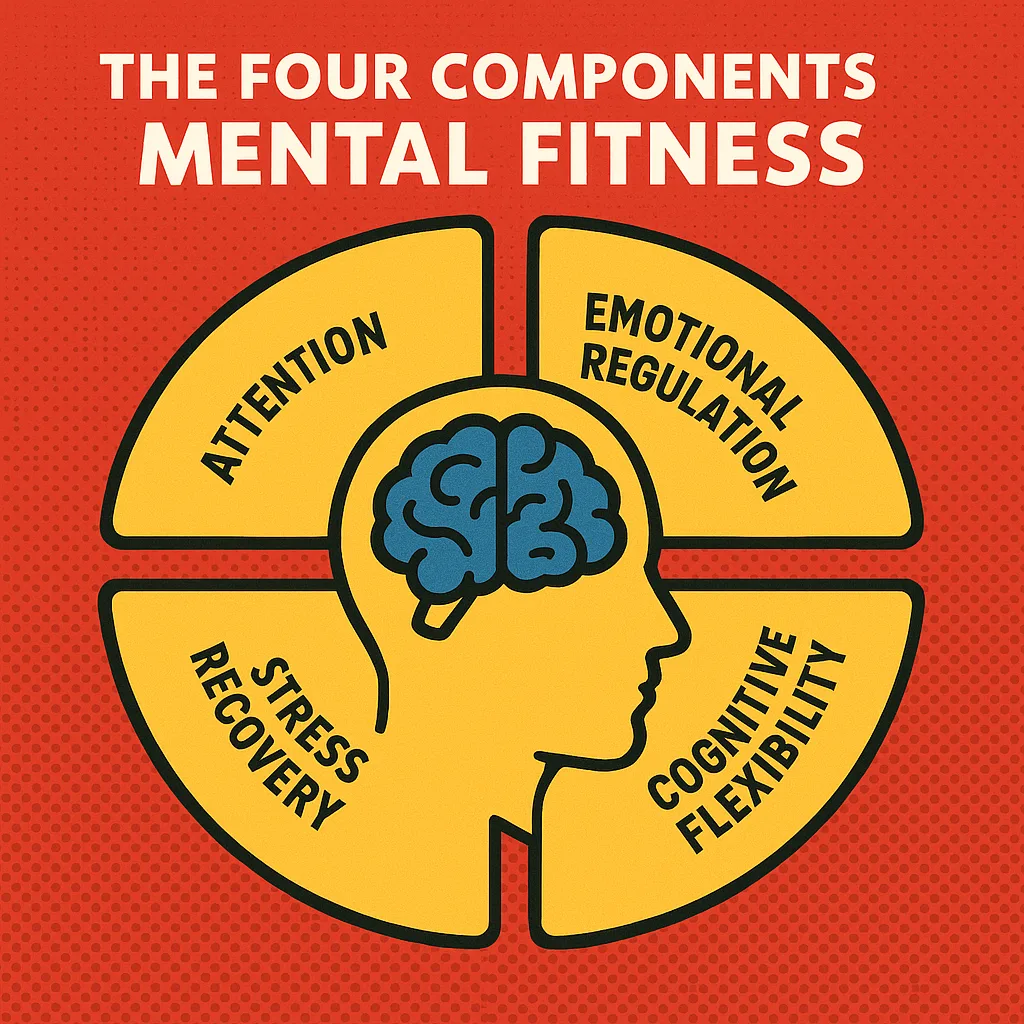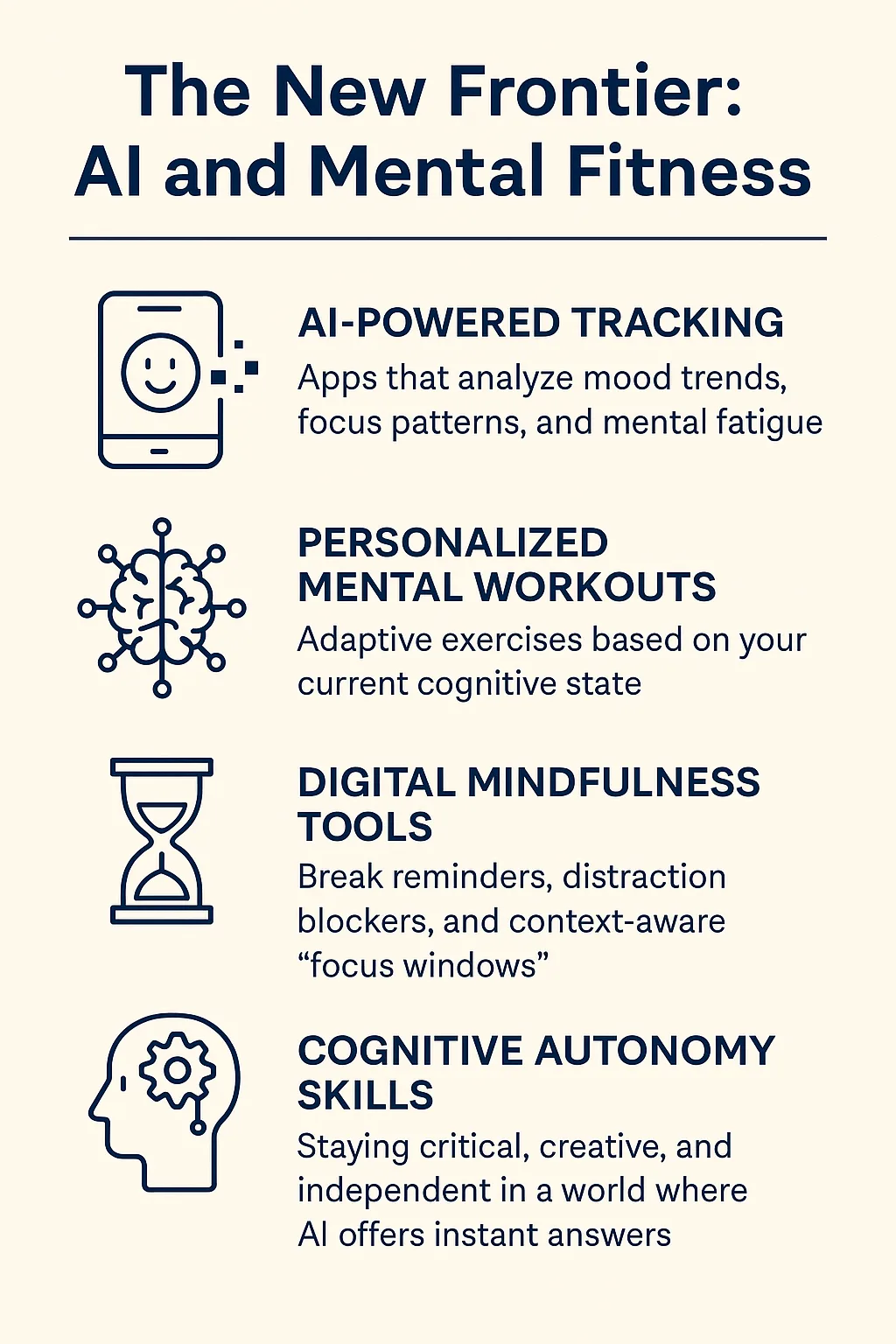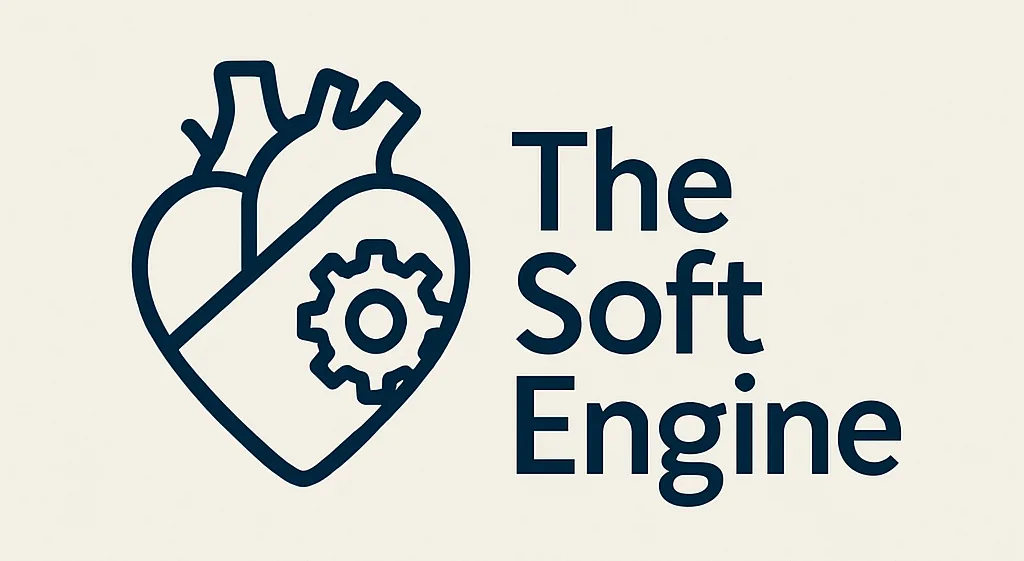What is Mental Fitness Table of Contents
By 10 a.m., you’ve checked five apps, answered a dozen pings, and your focus already feels split. That’s why mental fitness matters so much in 2025: it’s the capacity to meet life’s demands with clarity – managing stress, sustaining attention, and adapting without losing your center.
Hybrid work, constant notifications, and faster decision cycles make cognitive resilience a performance skill as critical as sleep and movement.
Mental fitness isn’t just breathwork and journaling anymore. AI is entering the toolkit, tracking focus in real time, spotting fatigue patterns, and serving adaptive training plans that fit your day.
With so many changes, online and in the real world, understanding mental fitness – specifically your mental fitness – has never been more important.
What Is Mental Fitness?
Think of mental fitness as trainable cognitive capacity plus self-regulation: the ongoing practice of strengthening attention, emotion skills, flexible thinking, and stress recovery so you can perform under pressure and return to calm quickly. It’s a toolkit you maintain, not a single habit or app.
Put at its simplest (and often the best way to understand), imagine your brain is like a superhero toolbox.
Inside the box are four special tools:
- A flashlight – helps you pay attention to what’s important.
- A calm button – helps you feel better when you’re upset.
- A magic switch – lets you change your plan when something new happens.
- A rest pillow – helps you relax after you’ve worked hard.
Mental fitness means practicing with these tools so you can use them anytime, like when you’re in a tricky game, someone changes the rules, or you feel grumpy and need to calm down.
It’s not just one toy or one trick. It’s the whole toolbox, and you keep making the tools stronger the more you use them.

How Mental Fitness Differs From Physical Fitness
Both require progressive load, recovery, and consistency, but the targets differ.
Physical fitness trains muscles and the cardiovascular system. Mental fitness trains neural pathways and habits of mind: attention, interpretation, and choice.
Your “sets and reps” are things like 25-minute focus sprints, 2-minute breath protocols, a weekly reflection, and deliberate novelty (learning a skill that challenges working memory and set-shifting).
Origin and Evolution
The concept draws from cognitive science, cognitive behavioural therapy (CBT), resilience research, and positive psychology. A decade ago, it mostly meant “stress management.”
Today, it’s proactive performance: designing days, environments, and practices that build clarity and adaptability before you need them so you can think clearly, choose wisely, and recover faster in complex, always-on contexts.
The Four Components of Mental Fitness
In that superhero toolkit we talked about earlier, you’ll find these four components.
Attention Control
This is your ability to keep your mind on what matters and block out distractions.
Signal: You switch tasks less often and can stay focused for longer stretches.
Example: You keep writing your report even when messages pop up—because you’ve planned to check them later.
Emotional Regulation
This means noticing how you feel, then choosing how to respond instead of reacting on impulse.
Signal: You calm down more quickly after stressful moments.
Example: You feel frustrated, take 1–2 minutes of slow breathing, and then respond thoughtfully instead of snapping.
Cognitive Flexibility
This is the skill of changing your approach without losing progress.
Signal: You feel less “stuck” and can find more than one solution to a problem.
Example: When a client changes the plan, you adjust the project into smaller phases instead of starting over.
Stress Recovery Capacity
This is how quickly your mind and body return to balance after effort or stress.
Signal: You sleep better, feel more rested, and avoid big energy crashes.
Example: After a tense meeting, you take a short walk and breathe deeply—recovering in minutes instead of hours.
Tip: Metacognition (your ability to notice and think about your own thinking) acts like the coach that helps all four skills work together.

Mental Fitness vs. Mental Health
It’s easy to get confused. So, think of mental fitness vs mental health as training vs. treatment.
Mental health focuses on diagnosing, preventing, or treating conditions. Mental fitness is proactive work that enhances your baseline – so you’re steadier under pressure, quicker to refocus, and better at navigating setbacks.
Related ideas:
- Emotional fitness: skills like naming feelings, reframing thoughts, and setting boundaries.
- Cognitive fitness: attention control, working memory, problem-solving, and learning agility.
They’re complementary. Strong mental fitness supports mental health, and caring for mental health makes training more effective.
Why Mental Fitness Matters
Stronger mental fitness delivers results you can feel (often within days), and they compound over time. It’s not about lofty ideals; it’s about how you show up in the moments that count.
Better stress tolerance: You register stress without being hijacked by it. When three urgent emails hit at once, you prioritize tasks instead of freezing or snapping.
Science: A trained nervous system returns to baseline faster, keeping cortisol spikes short and manageable.
Improved decision-making: You make choices from clarity, not reactivity.
Example: In a tense negotiation, you listen fully before responding, which earns trust and better terms.
Sharper focus: You give sustained attention to what matters most.
Example: Completing a client proposal in one sitting because you’ve minimized distractions.
Mechanism: Repeated focus “reps” strengthen prefrontal cortex networks responsible for attention control.
Greater adaptability: You can pivot without losing energy or confidence.
Example: A project changes scope, and you quickly redesign your plan without frustration derailing your day.
Mind–body connection: Movement, sleep, and nutrition directly fuel cognitive performance.
Example: After a week of regular exercise, you notice quicker thinking and better problem-solving in morning meetings.
Mental fitness exercises translate into calmer high-stakes conversations, quicker recovery from setbacks, and a steadier sense of control in daily life.
In a world where demands and distractions are constant, that steadiness is a major competitive advantage.
The New Frontier: AI and Mental Fitness
AI is becoming a cognitive environment we live inside. That changes what mental fitness means.
It’s no longer enough to meditate and manage stress; you now need the skills to work with and think alongside systems that shape your attention, memory, and decision-making.
AI-Powered Tracking That Knows You
Modern apps don’t just log steps or hours slept – they read patterns. Some integrate wearables like Fitbit, email/calendar activity, and biometric sensors to detect mental fatigue before you feel it.
Used well, this allows proactive recovery, like taking a 7-minute reset before mistakes or irritability creep in.
Pro tip: Look for tools that keep your raw data local or encrypted to protect privacy while still giving you actionable insights.
Personalized Mental Workouts, on Demand
AI coaching systems can now assess your current cognitive bandwidth and adapt training in real time.
If your focus is strong, it may give you a 20-minute working-memory drill; if you’re drained, it may prescribe a guided breath sequence or light journaling. This right-load, right-time approach avoids burnout while keeping skills sharp.
Digital Mindfulness That Feels Invisible
We’ve moved past clunky timers. New platforms sense environmental noise, monitor typing speed, or track micro-pauses to suggest a break.
Others filter your information feed so you only see what’s relevant during deep work blocks. The best tools fade into the background, nudging without nagging.
Cognitive Autonomy in an AI-First World
Here’s the hidden challenge: the more you outsource thinking to AI, the more you risk losing your intellectual fitness.
- Question outputs: Ask, “What assumptions is this based on?”
- Compare sources: Cross-check AI summaries with original material.
- Create before you query: Try generating your own ideas, then see what the AI adds.
These habits keep your reasoning muscles active.
Why This Matters for the Next Decade
As AI weaves itself into emails, meetings, and even our thinking process, mental fitness will be as much about agency as it is about efficiency. The future will reward people who:
- Harness AI to expand their capabilities.
- Maintain human creativity, ethics, and discernment.
- Know when to disconnect entirely to think deeply and originally.
The next generation of mental fitness isn’t just about resilience under pressure but staying the pilot of your own mind in an algorithm-shaped sky.

FAQ
Is AI making us more mentally fit or more dependent?
Both are possible. Used wisely, AI frees cognitive bandwidth and offers precise training. Used passively, it can erode attention and autonomy. Build guardrails: set focus windows, audit notifications weekly, and regularly validate outputs with first-principles thinking.
Can I build mental fitness without technology?
Absolutely. Breathwork, exercise, journaling, learning new skills, and meaningful relationships remain foundational. Technology is an option (not a requirement) for feedback and personalization.
How often should I train my mind like I train my body?
Aim for short, frequent sessions. 5–20 minutes most days, plus one or two deeper focus blocks weekly. As with physical training, consistency and recovery matter more than intensity alone.
Conclusion: What is Mental Fitness?
Mental fitness is the everyday practice of thinking clearly, feeling steadily, and adapting skillfully – on and off the clock. In an always-on world, these skills protect your well-being and elevate performance.
AI can be a powerful ally, offering insight and precision, but it also challenges us to guard our attention and judgment.
Pick one small step today: a two-minute breath reset, a 15-minute deep-work sprint, or testing a single AI-based focus tool with clear boundaries. Your future self will thank you.
Curious to get started? Measure your mental fitness today to get started on your health journey.

